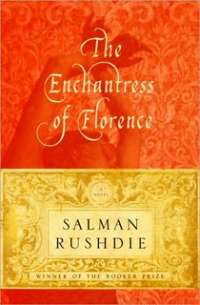The Enchantress of Florence

"In the beginning, there were three friends, Niccolò 'il Machia', Agostino Vespucci, and Antonino Argalia."
The Enchantress of Florence (2008) is the ninth novel of Salman Rushdie, which unapologetically mixes historical facts and fantastical elements without shame or mercy. It is mostly seen as a work of Magic Realism, but with quite a dose of fantasy element. Rushdie is particularly proud of the research he's done for the novel's writing, and proudly attached half a dozen pages of references at the end of the book—not bad for a work of fiction.
At the heights of the Mughal Empire of India, a blond traveller with a strange overcoat and, seemingly, magical prowess, came to visit Akbar the Great with a secret only a king may hear. He claimed to be under the protection of the greatest enchantress in the world: the titular enchantres of Florence. Strange things happened along the way.
- Art Initiates Life: Jodha, the Emperor's favourite queen, was apparently conjured up by him by sheer force of will. This is among the few moments in the story which is hard to interpret in non-magical terms.
- Inverted Trope: Dashwant, the imperial artist, fell so madly in love with Qara Köz that he managed to transform himself into a painting.
- Badass Boast: Akbar does this daily. The Scottish milord had one, too.
- Bag of Holding: The traveller's coat.
- Big Beautiful Woman: A prostitute in a whorehouse in Sikri, nicknamed "the Matress". People usually hire her along with her counterpart, the Skeleton, "to explore the extremes."
- Blasphemous Boast: Possibly. The book noted that when he says "Allahu Akbar" (God is great/akbar) he could very well mean "Akbar is God."
- Cluster F-Bomb: Ago Vespucci, to the point that many people assigned this to him as his defining characteristic.
- Cuckold: Everyone loves Marco Vespucci's wife, although it's unclear whether they ever bedded her. Being a nice, stupid lad that he was, Marco said such a beauty should be public property.
- Subverted by Praise-God Hawkins, which had departed so long from his beloved that he imagined daily that she had gone for another man back home.
- Dying as Yourself: Simonetta.
- Even the Girls Want Her: Several. Qara Köz and Simonetta to name two.
"Simonetta possessed a pale, fair beauty so intense that no man could look at her without falling into a state of molten adoration, and nor could any woman."
- Fat and Skinny: The duo of whores frequented by the main character.
- Flowery Insults: Oh yes.
"Why don't you go and masturbate a diseased goat?"
- Foe Yay: Akbar regretted killing the Rana of Cooch Naheen and wondered whether he had killed one of the few people capable of being his friend.
- Genghis Khan
- Genius Bonus: Inevitably, the historical in-jokes.
- Go Mad from the Revelation: Il Machia met a slave-girl which was transformed by potent hypnosis to be a "memory palace", a kind of exotic hard disk drive. He then attempted to restore the girl to a human state, but when she did, she remembered all the perils of her life and defenestrated herself.
- High-Class Call Girl: Alessandra Fiorentina and her minions.
- I Have Many Names: The main character.
- Impaled with Extreme Prejudice: Countless of Vlad Dracula's victims, as per history. Also, Simonetta.
- Les Yay: What the queens do to entertain themselves in their beds while the Emperor is away.
- Lonely at the Top: Akbar the Great.
- Magic Realism
- Mind Screw: If you try to figure out what is real and what is not.
- Mysterious Waif: Many characters.
- Niccolo Machiavelli: Appeared as a major character. Of course, since the real Machiavelli is a mysterious figure, Rushdie took extreme liberty in his portrayal.
- Our Vampires Are Different: There are vague references to the bloodsuckers, it's not even clear whether they're actually vampires.
- The Philosopher: Many characters, notably the Emperor and his trusted wise men.
- Porn Stache: It was fashionable at the time. Akbar the Great sported a particularly awesome one and was very vain about it.
- Precision F-Strike: See Sophisticated As Hell.
- The Renaissance: Straight from the heart of it—Florence.
- Royal We: Played With. Akbar thinks of himself as the entirety of his power and uses "we", but toyed with the idea of the "I", which he finds very alien.
- Self-Made Orphan: The emperor knew he must either Off The Offsprings or they will have their ways.
- Sex Is Good: Possibly everyone in Florence.
- Shout-Out: Thee four giants are Otho, Botho, Clotho, and D'Artagnan.
- Shown Their Work: The research Rushdie did for the historical bits.
- Sophisticated As Hell: It can feel like this at times, usually as a Precision F-Strike.
- Take That: Rushdie doesn't have a history of good rapport with religious fundamentalists (The Satanic Verses and everything). There is one such character. Not very nice things happened.
- Upper Class Twit: The royal princes are these at least half the time.
- Very Loosely Based On True History: Do not cite this work for your history assignment!
- Warrior Poet: Most notably Akbar himself.
- Wholesome Crossdresser: The king's private spy.